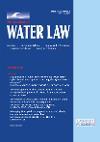Journal of Water Law - Volume 27 - Issue 4

ARTICLES
Digitalisation of water services and the water sector cyber threat landscape: Is the EU regulatory framework adequate?
DIMITRA MARKOPOULOU
VAGELIS PAPAKONSTANTINOU
Vrije Universiteit Brussel
Like other sectors, the water sector has increased its dependence on information and communications technology (ICT) to improve its service, sustainability and affordability, but this also makes it increasingly vulnerable to malicious cyberattacks or accidental cyber incidents. Water sector entities are also responsible for processing and protecting personal information, including employees’ records and customers’ billing data. While the current EU regulatory framework on water management has undergone considerable reform, it does not deal with the protection of water facilities against cyber risks. And although both EU cybersecurity policy, including the protection regime for critical infrastructures, and the General Data Protection Regulation are fully applicable to water entities, the new digitalised water landscape calls for a shift in approach in order to create a more cyber resilient water sector.
The management of the Guarani Aquifer System: a ‘stop-and-go’ pattern of cooperation among states
ELENA QUADRI WARREDOC –
University for Foreigners of Perugia (Italy)
This research focuses on the Guarani Aquifer System common to Argentina, Brazil, Paraguay and Uruguay, and on the cooperation process among the four countries that resulted in the Guarani Aquifer Agreement of 2010, modelled on the principles enshrined in the United Nations Draft Articles on the Law of Transboundary Aquifers (2008). The analysis bears out a ‘stop-and-go’ cooperation pattern: nothing substantial happened from 2010, when the Agreement was signed, to 2019 when cooperation resumed thanks to the Guarani-2 project, which culminated in the Agreement finally entering into force on 26 November 2020.
The impact of wastewater treatment effluent on water resources: a South African perspective
TAKALANI PHUNGELA, BABALWA GQOMFA, THABANG MAPHANGA, KARABO SHALE
Cape Peninsula University of Technology,
South Africa
The deteriorating state of municipal and industrial wastewater treatment facilities and infrastructure globally is one of the largest contributors to pollution in water resources especially surface water. This article presents a review of the impact of discharged effluent on the receiving water resources from a South African perspective. It further discusses the influence of municipal waste- water and sanitary infrastructure on the quality of discharged effluent and reviews legislative frameworks, regulations, and policies related to the treatment and discharge of treated effluent and environmental protection in South Africa, where enforcement and aging treatment infrastructure is a challenge.
Managing blue gold: a comparative study of Islamic law and international water law
MOHAMMAD DAUD REZAEE
Professor of International Law, Kateb University
GLEN HEARNS
Principal of Eco Logical Resolutions
CHRISTINA LEB
Senior Counsel (World Bank) and Research Fellow of the Platform for International Water Law, University of Geneva
Transboundary rivers not only cross international borders but they also traverse territories governed by different legal cultures and systems, which raises the question of how differing legal systems relate to rules of international water law, and in particular the international rules governing the management of shared fresh- water resources. Many of the most arid transboundary river basins include states whose legal systems are influenced to varying degrees by Sharia law. This article discusses the relationship between Islamic guiding principles and principles of international water law governing transboundary rivers, and highlights their similarities and differences. While not initially apparent, the two legal systems have many commonalities and the article out lines what Islamic guiding principles offer for water management in general and transboundary water management in particular.
BOOK REVIEW
Science and Judicial Reasoning: The Legitimacy of International Environmental Adjudication
Katalin Sulyok
